Going Remote
The hectic nature of modern life has left many folks with a desire to return to the land and a fascination with remote living. Escaping to a little cabin in the woods to lead a more simple existence is a common fantasy. We have been lucky enough to experience it.
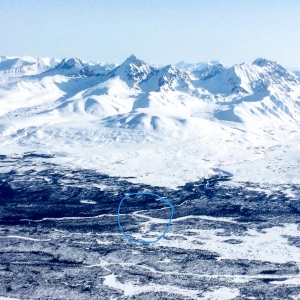
Home sweet home!
Probably the most common inquiry we get besides those asking about our vacation packages, are those looking for advice. Many folks send questions about living in the bush, finding land, and starting a remote homestead. These are all tricky questions. Beginning a remote homestead is a very personal undertaking. Everyone has different expectations and goals. Looking back on our experiences to date, I have come up with a few questions that I send to folks.
In this post, I will run through these questions. It is a little bit disorganized, but I think provides a fair amount of basic information.
We get lots of specific questions, as well, and I will answer those in a follow-up post.
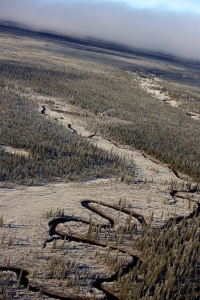
View of flying into the Homestead in Late Fall.
⠀⠀Remote living Food for Thought
1. What does remote living mean to you and what do you think remote life “looks like?”⠀
2. What is your motivation for going remote? ⠀
3. Have you calculated a budget or thought about the cost?⠀
4. What are you willing to give up? Or, more importantly, what aren’t you willing to give up?
5. Realistically, what are you capable of? What skills do you need to achieve your vision? How are you going to get those skills?⠀
To preface, our particular situation is one of the more extreme. We are airplane only accessible, about 170 miles from the road and 70 from the nearest village. The parcel also lacked an access point. Keep in mind that there are as many ways to go about the whole remote-living, homestead “thing”as there are folks that live it. This perspective is one of many.
What does remote living mean to you and look like?
Remote means many things. Fly-in, Mush-in, Train-in, Hike-in, ATV-in, Boat-in. To me, remote means off the road system in a wilderness area. It means, to me, flying into town. It also means no sounds of the car, no easy access to stores, and no access to utilities. Remote living, to me, meant building our home, growing our food, having some kind of business and working with off-grid systems. Most importantly, it meant a deep immersion in the observations of the natural world. Most of these prerequisites could mean a place closer to a town. There are plenty of folks that check most of these boxes on a road near the highway.
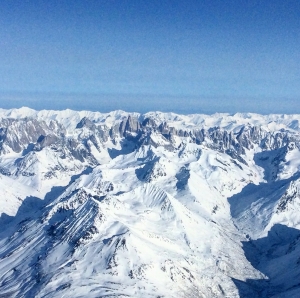
A favorite view on the “commute.” The Kichatnas
So, what does it mean to you? Does going remote mean an ATV ride down a dirt path? Does it mean not living in a large town? Or do you want to fly a bush plane? Spell it out.
What is your motivation for going remote?
Define your motivation. Once, when I was setting out on a long distance hike, it was recommended to me that I have a list of reasons for the “why.” I find this advice applicable to so many different tasks. Living remotely or homesteading is not easy. There will be many days when you want to throw in the towel. Having a list of your motivations to remind yourself why you are where you are will help you through the harder times. It will also help you choose the right place and situation for your wants.
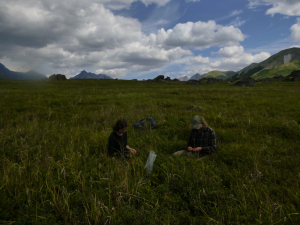
Collecting berries. Freedom, profound beauty, and delicious wild food.
Do you know what it will cost?
People often think that living remotely will be cheap. I think that this isn’t always true. The process of setting up can take a while. Those first few years may be expensive. Think about what you will need, and do some math. If you don’t want to leave the homestead while you are setting up, try to have at least 1-2 years of living expenses saved up prior to the move. A lot of people work at their homestead during the winter and leave to work during the summer. There are many permutations on the making a living in the bush.
Alaska is not cheap no matter where you live. Off the road system is even more expensive. In the village closest to us, Aviation gas currently costs $8.60/gallon, regular gas costs $6.90/gallon. A bag of chips costs an astounding $9.00.
On a more specific note related to cash… People think they will be able to forage, hunt, and grow all of their food. You can work towards that, but it likely won’t happen right away. Hunting and foraging cannot take place year round. It also takes a while to get a garden established and productive. At least for a while, you will be bringing in (at some expense), food from the store.
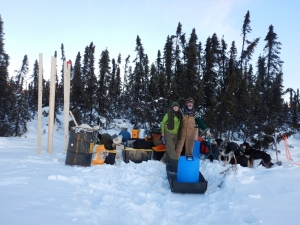
A winter’s supply of food and building tools.
“But hey,” you say, “weren’t there a lot of folks that went out with nothing and made a living back in the day?” Well, read their packing lists. They packed salt pork, coffee, beans, and rice. Additionally, there are Fish and Game regulations these days. You can’t just shoot a moose whenever you feel like it
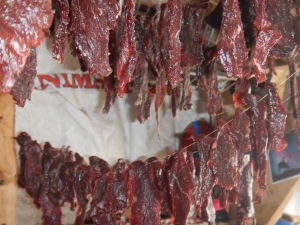
Folks also think they can make a lot of money trapping bush. Well, just take a look at fur prices . Trapping can supplement your income a little bit, but there are very few people that make it full time as trappers these days.
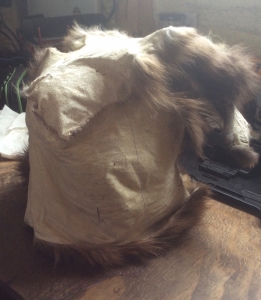
Trapped marten hat in progress. We make a few fur garments for ourselves and friends, but cannot make a living on it. I’m not sure I can think of anyone that does.
We were very lucky to have savings and work that came to our remote home for the first four years. Our homestead would look extremely different if we did not have that initial income. It would have taken much longer to achieve what we have were it not for that work. We currently work from time to time away from the homestead with various “side gigs.” We do not make a living 100% from the homestead. In most situations that is a great dream to work towards but don’t expect that to happen right away. Many folks, any least for a while, live part time on their homestead and work the rest of the year. If that is the case, you won’t need as much seed money to get started.

Burl bowl carved for sale
What are you willing to give up? What aren’t you willing to give up?
Are you willing to give up going out to the bar on the weekend? Coffee shops? Ordering food and your favorite coffee?
Are you willing to have to work for the basics: water, your heat source, your home. Everyone works. Coming home from work and turning up the thermostat is different from keeping a fire stoked round the clock.
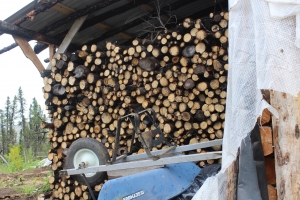
Part of the firewood stash
Think about it realistically. Some of the things you give up won’t be forever, some things will. For example, we went three years without the ability to get to town by our own volition. Travel was entirely dependent on someone else’s schedule. It was also fairly cost prohibitive. This resulted in less time with family and friends. That was extremely hard. Now that we have our own airplanes and airstrip, that situation looks very different. We will likely, however, never have Chinese food delivered.
Additionally, you won’t be able to anticipate many of the things that you might miss or all the things that you will love. Really thinking through what you are willing to sacrifice will help you define where you end up.
Most importantly (and kudos for making it this far in the post), what are you capable of? What skills do you need to achieve your vision? How are you going to get those skills?
Give yourself an honest look. What are you, realistically, capable of? I barely knew how to build a damn thing and have very basic construction skills. If I had gone out into the wilderness by myself six years ago and attempted to build a log cabin, it would not have gone well. Today, I might have an honest chance. Luckily, Morgan and I had skills that supported one another. He had an abundance remote building experience. So we built a cabin with material sourced on site.
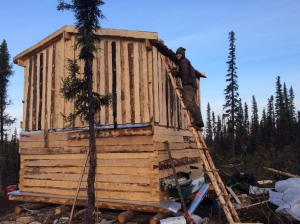
Learning to build
So, as an example: If you don’t know how to build a cabin, how are you going to learn? Could you perhaps amend your goals to living on a property with an existing cabin?
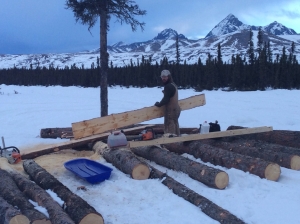
Milling Lumber with an Alaska Mill
Write out what you want to achieve on your property. Same example: You want to build a cabin. What will you need to know? Run a chainsaw and safely fell trees. Safely use and sharpen tools for peeling, limbing, notching. Clear land for a cabin. Etc. Etc. Go out and educate yourself.
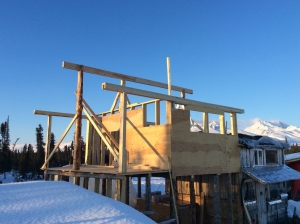
We have a few different structures on our property, all built with different methods and materials. Each one was an experience. They are rustic, imperfect, and suited to the circumstances
Keep in mind that “building a cabin” (or anything you do on a homestead) is not a one size fits all thing. Different building styles take different skills.
Final thoughts
Recommendations? Take every class you can find that would even peripherally benefit you. Read– ALOT. Talk to folks and ask them questions—ALOT of questions. One of my favorite things is to read old homestead books from Alaska. A lot of the writing is poor, but I always take away some interesting insights.
Also, take a Wilderness Medicine class and know how to use a map and compass.
Remote living comes in many shapes and sizes. It is not meant for everyone. Hell, I don’t think its for me everyday. Educating yourself and really articulating the reasons “why” will make the leap more feasible and enjoyable.
Please send questions. Let us know what information is helpful or not helpful. This is hard topic to write about and your input is welcome. What else would you like to know about remote living?
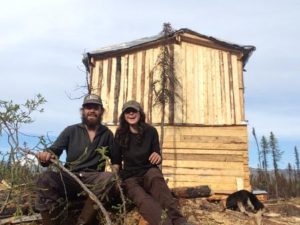
Our first structure on the homestead. We Did It! 2015

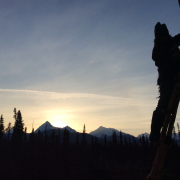
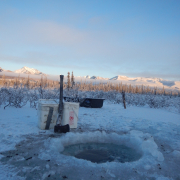
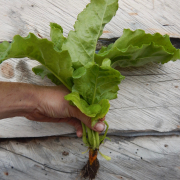
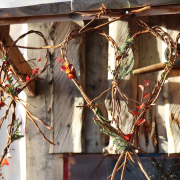


Leave a Reply
Want to join the discussion?Feel free to contribute!